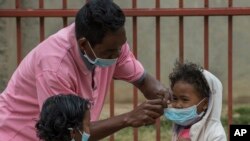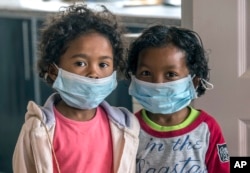The World Health Organization reports pneumonic plague is continuing to spread at an alarming rate in urban areas of Madagascar and greater effort is needed to bring this deadly disease under control. Latest figures put the number of suspected cases at 1,153, including 94 deaths.
Health agencies are worried at how quickly this disease is spreading so early in Madagascar’s plague season, which runs from September to April. The disease usually infects some 400 people a year. But this year, with six more months to go, the number of suspected cases is nearly three times higher than normal. WHO Regional Emergency Director for Africa, Ibrahima Soce Fall, says the spread of the disease is faster because pneumonic plague, which is transmitted from person to person, has moved from the remote rural areas to congested urban areas. It is mainly found in the capital Antananarivo and the port city of Toamasina.
Nevertheless, Fall tells VOA he is confident WHO in coordination with the Ministry of Health and other agencies will be able to contain the disease in short order. He says WHO has provided enough antibiotics to treat 5,000 patients and to protect up to 100,000 people who may have been in contact with an infected person.
“This can be controlled relatively quickly if we manage to improve the contact tracing as we are doing right now," said Fall. "So, with the teams who are already used to contact tracing and putting all contacts under antibiotic prophylaxis, we can prevent the disease. I am confident that with the strong team we have on the ground, in common with some partners coming and more health workers, we will be able to revert very quickly the trend.”
Fall cautions, though, it will be important to remain vigilant after transmission is over. He notes stopping the transmission of the plague does not mean the risk is gone. He says the virus is still in the country, and while people continue living in poor, unsanitary conditions, the disease is likely to recur.





